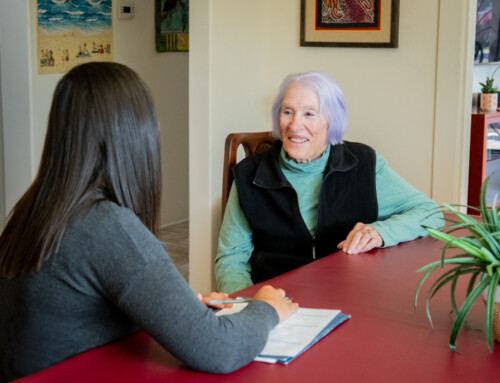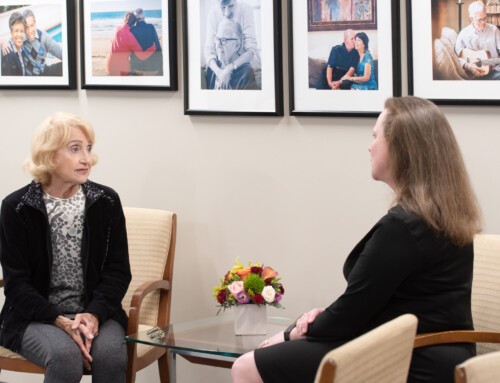
If a person living with dementia requires a hospital stay, care partners may worry about the person’s ongoing care once they leave the hospital. We’ll explain the rights of Medicare beneficiaries to safe discharge planning and how to advocate for this plan with hospital staff.
Hospital Discharge Planning: The Basics
Medicare-affiliated hospitals are required to ensure that patients with Medicare receive a safe discharge. This means that the place the person will go after a hospital stay has the following:
- Caregivers who are prepared and able to meet the person’s needs
- Access to proper medical equipment, supplies, and other supports
- An environment that does not pose significant health risks to the person
Care partners, patients, and even doctors might assume that the best place for a person to go is back home. However, this is only the case if the above criteria are met. It is the duty of the hospital to help patients and their care partners to either make home “safer” through supportive services or find a safe alternative. It is very important that a patient does not leave the hospital unless the care partner understands the discharge plan and feels comfortable carrying it out.
How to Advocate for a Safe Discharge
- As soon as possible after admission, ask to speak to the discharge planner. This person may also be referred to as a case manager or social worker. Discuss what kind of care this person will need upon discharge and stay in communication about the discharge plan and date.
- As soon as you are aware that a discharge plan is being created, tell the discharge planner about any concerns that may affect the patient’s safety. If the discharge plan does not address these concerns, tell the discharge planner “It is not safe for him/her to go home.”
- The discharge planner must ensure a safe discharge plan, and find a suitable care facility if home is not a safe option. If a care partner feels uncomfortable with the discharge plan, they have the right to say no. You may appeal a hospital discharge decision by calling Livanta, the Medicare Quality Improvement Organization, at 877-588-1123.
Support Under Medicare
The discharge planner can provide various services to help meet the person’s care needs. Many are covered by Medicare if deemed “medically necessary” by a physician. Covered services include:
- Home health care – A home health aide or other medical professional comes to the home intermittently (not 24/7) to assist with medical needs.
- Durable medical equipment – Walkers, hospital beds, oxygen tanks, etc. for in home use
- Mental health services – Outpatient visits to a psychiatrist, psychologist, etc.
- Rehabilitative services – Physical, occupational and/or speech therapy
What to Do When Medicare Does Not Cover Needed Care
Sometimes a person living with dementia requires more intensive and ongoing care, especially if there are safety concerns. Assistance with supervision, bathing, toileting, and other basic needs is referred to as long-term care. This type of care is commonly provided by an in-home care agency or a residential care community (such as an assisted living or memory care community). Unfortunately, Medicare does not cover long-term care, and few can afford to pay high monthly out-of-pocket costs.
If placement in residential care is not an option, it may be necessary to find a Skilled Nursing Facility. This may be covered temporarily by Medicare and on a long-term basis by Medi-Cal. Here are some tips to access this kind of facility when long-term care is needed:
- If the doctor has not already determined that skilled nursing care is needed, ask the person’s primary care doctor to call the hospital and advocate on their behalf.
- Ask the discharge planner for help to access a nursing facility that accepts both Medicare and Medi-Cal. In order for Medicare to cover the cost of a nursing facility, the patient must first be admitted to the hospital for 3 consecutive days.
- Begin the Medi-Cal application process as soon as possible upon admission to a SNF. Medicare will cover the first 20 days, after which a co-pay will be required until day 100, when coverage ends. A person may be eligible for Medi-Cal regardless of their monthly income, but may be required to pay a share of the cost.
For more details and help with your situation, call us at 858.492.4400 to speak with one of our dementia experts who are here to help San Diego County residents and/or those caring for someone living in San Diego County (Spanish speakers available). Also check out our free education classes, social activities, caregiver support groups, & more.
RECOMMENDED: Universal Design & Dementia: Creating a safe & happy home
Posted on November 18th, 2024
Additional Resources: CANHR (California Advocates for Nursing Home Reform)




